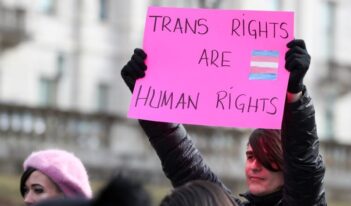
Federal and state reforms are needed to protect elderly LGBTQ+ individuals.
The LGBTQ+ rights movement has made significant strides over the last few decades, scoring major policy wins on marriage equality and employment non-discrimination while shifting the cultural landscape toward greater understanding and acceptance.
Yet this progress has not benefitted the entire LGBTQ+ community, as evidenced by the widespread inequities facing more than 2.4 million older LGBTQ+ adults in this country.
Older LGBTQ+ adults struggle with a range of problems related to their economic security, health, and general well-being. Because they have dealt with a lifetime of discrimination in education and employment, these individuals experience high rates of poverty, rely heavily on public assistance and support from aging services providers, and hold serious fears about their retirement security. Poverty and discrimination lead to health disparities for older LGBTQ+ people, including disproportionately high rates of diabetes, asthma, heart disease, HIV, and cancer.
Studies have also shown that, compared to their non-LGBTQ+ peers, older LGBTQ+ adults are more likely to live alone and less likely to have significant others or children. These factors drive many of these individuals prematurely into long-term care for daily support and place them at high risk of social isolation and loneliness, which can be life-threatening without targeted interventions.
Older LGBTQ+ individuals also face discrimination in housing, long-term care, and under various laws. They experience a lack of affordable, LGBTQ+-welcoming housing options as they age, differential treatment when seeking housing, and actively carry the fear and lived experience of discrimination in the long-term care system, whether in their own homes, in residential care settings, or in nursing homes. Within the older LGBTQ+ adult community, people of color, women, transgender people, people aging with HIV, and immigrants face additional, unique hardships that remain insufficiently addressed in policy and practice.
The primary policy barrier confronting older LGBTQ+ adults stems from the fact that many of them reside in parts of the country without adequate anti-discrimination protections based on sexual orientation and gender identity. So, the discrimination they routinely face as LGBTQ+ people in housing, long-term care, and health care settings remains legally permissible. The lack of legal protections extends to the primary caregivers for these individuals as well, with “families of choice” often excluded from paid leave and caregiving laws that limit caregivers to biological relatives and spouses.
In addition, the federal government has historically underfunded aging services specific to older LGBTQ+ adults—as evidenced by the long exclusion of LGBTQ+ people from the Older Americans Act, the largest funding vehicle for aging services in this country. This exclusion has harmed the widespread growth and sustainability of LGBTQ+-friendly health and well-being programs, legal and financial support services, social programming, friendly home visiting, support groups, technology programs, and more. In addition, training programs that promote LGBTQ+ competence among health and long-term care professionals remain limited given the lack of government investment in such critical training.
Although research on older LGBTQ+ adults and overall evidence for aging interventions has grown significantly over the last 10 years, public policy continues to marginalize this community in data collection and research initiatives.
Federal and state surveys on aging, long-term care, and health do not always include LGBTQ+-related questions. In general, research on older LGBTQ+ adults needs improvement. For example, a 2019 systematic review of LGBTQ+ aging research from 2009 to 2016 found that although research expanded in that period, several topics remained neglected, including people aged 80 and older, bisexual individuals, older people of color, gender non-binary older people, intersex people, and people living in poverty. The review also found that more longitudinal data and stronger intersectional analysis were needed.
Older LGBTQ+ people—who disproportionately require paid care as they age—also struggle with the high costs and systemic failings of long-term care in the United States. Like others who require long-term care, many of these individuals must whittle down their income and assets to qualify for Medicaid, the primary public provider of long-term care. Yet even when they are eligible for Medicaid services, aging LGBTQ+ individuals might not be able to find available workers to deliver care, given how poor job quality drives many direct care workers out of this field.
To address these policy barriers and improve the lives of older LGBTQ+ adults, federal and state lawmakers should enact several measures.
Congress should pass the Equality Act, which would add sexual orientation and gender identity protections to existing civil rights laws and protect older LGBTQ+ adults—regardless of where they live—in employment, housing, services, federally funded programs, and more. In addition, paid leave and caregiving laws should expand their definitions of “family” to include families of choice.
Federal and state leaders should invest in better data collection and more research on older LGBTQ+ adults to understand how they access and experience aging services and long-term care. Major surveys related to aging, long-term care, and health—such as the National Survey of Older Americans Participants—should also include questions on sexual orientation, gender identity, and age, to capture the realities of this community.
Policymakers at all levels should increase funding for LGBTQ+-specific aging services, elder housing needs, and cultural competence training—all with an eye to the unique needs of more marginalized populations, including people of color, transgender and gender non-conforming people, and people with HIV, among others.
Finally, recognizing the persistent hostility aimed at LGBTQ+ people across the country, federal and state lawmakers should resist enacting the widespread anti-LGBT proposals that aim to strip LGBTQ+ people of their rights. As elder LGBTQ+ people know, discrimination accumulates across the lifespan, shows up more harshly in later life, and should be stopped as early as possible.
Older LGBTQ+ adults have lived through decades of discrimination, which has harmed their health and economic security—but these inequities can be overcome. Policymakers should enact a range of reforms to support generations of older LGBTQ+ adults to age safely with dignity, independence, and social connection.
This essay is part of a 9-part series, entitled LGBTQ+ Rights and Regulation.




